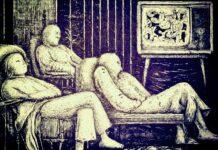Istared out of the window. There was nothing to see through the frosted glass. Only when the sun was shining just right could I make out the shadows of the Mexican petunias. Only when it poured could I tell it was raining. It wasn’t something I grew used to even after weeks and weeks inside those walls. It wasn’t something I thought anyone could get used to. It wasn’t something I thought anyone should get used to.
Still I tried to make out more, looking through the window from different angles, squinting to no avail. I imagined people passing by. I imagined them going home to family or out to dinner with friends. Maybe even going off to do something that they shouldn’t. I felt disconnected from them all. I felt different than them all. As if I was another species altogether. What if they could see inside? See me in this box? What would they think? Would they even care?

“Josey,” someone called out, breaking me from the daydream.
I dragged my feet over to the tech.
“Doctor wants to see you,” he mumbled and gestured over to the second door across from the nurse’s station.
I knew the drill. I’d been doing it most days for the past six weeks. It would be: how are you, how are you sleeping, how are you eating, how are the voices?
Like clockwork I’d respond: okay, good, fine, they’re gone. It was the life of a psychiatric patient diagnosed with Schizoaffective Disorder.
For the umpteenth time the psychiatrist would say, “Well, let’s give it some more time and see how you continue to do on these meds.”
But I’m smart; I knew that they were just trying to ease my mind while they did absolutely nothing. I was just in a waiting room. A large waiting room from hell — where you eat and you sleep and you have to ask to use the bathroom. A waiting room where you have been forced to wait for the doctor not to say “welcome” but “goodbye.” Waiting to be released, not to be seen. Because, well, the psychiatrists never seemed to SEE you anyway.
Another day, another meeting with the psychiatrist. Again it was: you’re not ready to leave (even though I knew I was well enough). Well, mostly. Enough that I wanted to get the heck out of there. I felt grief for the things that I couldn’t do, for the happiness that was out of reach. For my freedom.
That grief quickly turned to anger, an emotion I was not familiar with. For my entire life my anger was expressed as sadness. My anger was turned inwards as I fell deeply into black holes of dark thoughts. I fell into those voids willingly most of the time. So, this true anger felt uncomfortable; I wanted to get it out but didn’t know how.
Just like I never felt anger, I never swore. I had made some sort of unprompted pact with myself in middle school not to curse. People thought it strange and would apologize to me when they used foul language. I reassured them that it didn’t offend me in any way. The promise was mine and mine only. So when those words began to come out in conversation and complaints during family visitations my loved ones knew how much I was struggling with the helplessness.
The days blurred together. It was now eight weeks into my stay. I had seen dozens and dozens of patients on the 30-bed ward come and go. I was friendly with many. Some people became almost like a friend — usually just in time for their stay to be over. Others I avoided with good reason. The ones with the orange pants that signaled that they were on their way to jail next. The men who had a strange look in their eyes.
There was Sean who was a father, a Marine, and a meth addict. I thought he was also the most enjoyable person there to talk with. We would pace and pace around the common area just chatting away. Everyone would comment on how we were doing our rounds. We would talk about the serious things and the silly things in life. I had dealt with enough of those men with strange looks in their eyes to really appreciate our completely platonic and genuine friendship. He was hard to say goodbye to but not enough that I’d want to talk to him on the outside. I had once learned my lesson about talking to fellow patients beyond their stays.
There was Emma who came in after a suicide attempt. She was seated in a wheelchair with her arm in a sling. She had that unremarkable and unmemorable mousy look to her. I sensed how defeated she felt. After days in her hospital bed Emma’s long, straight, fine blonde hair found its way into a terrible rat’s nest. They told her, “We’ll just have to cut it off.” I took one of the small black combs that the unit provided. The little ones a man might carry in his pocket. I spent hours softly combing the waist-length hair into its former beauty. I knew that Emma losing her hair after losing her freedom would’ve done more damage than one not in her position could imagine.
There was the man who showed up in the middle of the night and ripped the communal telephone out of the wall. The woman who was in complete psychosis when she came in and when she left three days later. The man who definitely shouldn’t have been there, not because he didn’t need help, but because he needed far more help than they could provide. The woman who was barely a woman in age or looks or character. She was innocent and doe-eyed and everyone around her just wanted to protect her from the cruel world.
The weeks continued on. Every day was the same but different. Disposable toothbrushes and sporks. Crayons instead of pens. Little pills in little paper cups. Someone would come. Someone would go. The days turned into nights and back again.
Soon a full moon coincided with a Saturday night. The unit was beyond capacity once again. I thought about how that saying must really be true. People slept on the couch and on mattresses on the floor. People argued with the nurses about how much they didn’t deserve to be there. People puffed out their chests and confidently told anyone who would listen about how their lawyer would be on this ASAP. Others just slept, unencumbered by the chaos and the fluorescent lights.
The next day I heard again, “Doctor wants to see you.”
Just like that they decided to let me leave. No more imprisonment. No more time on the unit. No more medication changes. Discharge. It didn’t seem real, but it didn’t seem like one of my delusions either because, well, it was real.
Naturally, I was overjoyed. Freedom.
It seemed sudden and random but, I knew. I knew why the release came up so out of the blue. The beds were full. My insurance had decided that I no longer needed to be there. It didn’t matter if the doctor thought I did (and they did) because the real people in power (the ones with the suits and the numbers) knew what I was. I was just a bed — a bed that wasn’t making them $1,000 a day in insurance payouts anymore.
As my mom picked me up in my favorite sweatpants with the drawstrings pulled out and my hoodie with the hood cut off I had a smile on my pale face. Behind the smile was fear though. What do I do now? I was happy to be free, to be able to see the purple of the Mexican petunias and to know it was raining even when it was merely a drizzle, but what is a girl to do when she knows she’s ill. When she knows all is not well but doesn’t want to be a caged bird?
Maybe one day I’ll find out, but that day was just a day to be free.















I love you Jo. You are so beautiful, intelligent and amazingly talented. So sweet and so incredibly strong. You have been through horrendous circumstances where you are totally powerless and at the mercy of complete incompetence and continue to come out the other side even stronger. You are an inspiration. You manage to stay mostly sane in this insane world.
Report comment
So beautifully written! If any readers think Jo exaggerates, my experiences in a psych ward were very similar. Treatment of the mentally ill–particularly of depressed and suicidal people –MUST change from reliance on meds. My book “Broken: How the broken mental health care system leads to broken lives and broken hearts ” goes into more detail than I can here. All the very best to you, Jo.
Report comment
Thank you! I will definitely have to check out your book!
Report comment
I agree with Janis. I wanted to add that you are a very talented writer.
Report comment
I feel I know what you’re talking about, not from the perspective of having been a “patient”, but from hating my job as RN on a psych ward. I began journaling before I retired; I wish I could express myself as well as you do. And I’m ashamed that I didn’t openly express my dissidence while I was working. I did slip it into my charting (which was ignored).
Report comment
Oh how beautiful this is. Not to mention you’re a fellow artist! Your experiences sound so much like mine. I read where Linda said the same thing. I want to also second the comment about it not being an exaggeration. It is far from it.
My first hospitalization was traumatic but luckily I was able to dive into my art. I was given permission to make a chalkboard mural.
Again, thank you for sharing your experiences in such a raw; beautiful way.
Report comment
Thank you for this very effective story. You expose the fraud so well. I admire your creative talents. Be Well.
Report comment